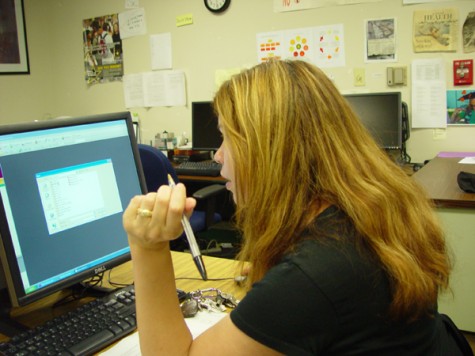The Annenberg School of Journalism at USC hosted Community College Journalism Day, an annual event sponsored by the McCormick Foundation, on Oct. 9, featuring an illustrious line up of news veterans gleaned largely from the Los Angeles Times.
The purpose of this gathering was to stimulate, inform and challenge the young minds in attendance with various panel discussions and workshops.
The Annenberg School has the immediate effect of overwhelming visitors with myriad television screens portraying the latest news spin. The blazing screens and flapping gums of news anchors on the wall form a metaphorical collage alluding to the hectic nature of the journalism business, as well the seemingly random influx of information that the news leaves us with each day.
The first speaker, Robert Scheer, gave his keynote address to the approximately 100 students in attendance. He is the editor-in-chief for TruthDig.com, a Progressive online news magazine that has a self-described mission statement of “conducing in-depth exploration of contemporary topics,” and has been involved with various news organizations since the 1960’s, notably Ramparts magazine, The Nation, the San Francisco Chronicle and the Los Angeles Times.
“I don’t know who said it first,” he said, “but the role of journalism is to afflict the comfortable and to comfort the afflicted.” After touching on such diverse topics as the Vietnam War, President Obama’s Nobel Peace Prize and his own college experience, Sheer voiced his wholehearted endorsement of the internet.
“The freedom of the press is guaranteed only to who own one,” he said. The Internet makes it possible for virtually everyone to own a “press.” Sheer’s primary message and the theme of his speech however, was a more powerful and universal one. He argued that despite the current decline of the unsteady journalism industry, there is “no better time to be a part of the 4th estate,” meaning the unofficial fourth branch of government: journalism.
The first round of workshops, “sharpening your skills,” included such topics as basic reporting and writing for online publications. Bill Boyarsky, former city editor for the Los Angeles Times, spoke about his techniques for cultivating news sources in the reporting workshop.
Boyarsky set a light and informal tone for his workshop, which was a pleasant departure from the gravity of the keynote address. He first began by explaining the fundamentals of journalism and the importance appearance, wit and charm. He then warned the listeners of the fate of the ill-prepared and enforced the essential nature of doing your homework on the story and knowing facts about the interviewee beforehand. To wrap up his conversational lecture, Boyarsky summarized his ethical rules as, “Don’t steal, Don’t lie,” and half-jokingly, “Don’t sleep with your news sources.”
The subsequent sessions, described as the “branching out” workshops, covered the varying fields of investigative reporting, magazine journalism and photojournalism. Los Angeles Times reporters Scott Glover and Matt Lait, best known for their role in exposing the Rampart scandals, lit up the room with tales of municipal corruption and the moral duty of the journalist. They discussed tactics for investigating suspicious cases and “how to” methods of utilizing public records.
Kit Rachlis, former editor-in-chief of Los Angeles Magazine, preached the importance of “understanding the reality of your business,” in the magazine writing workshop, which was devoted to the technological aspects of the developing digital media market, including such devises as Kindle.
Rachlis inspired his listeners to devise innovations for the future of the magazine industry and stressed how crucial it is to be aware of your field of study.
The day concluded with panel discussions and lunch. In contrast to the lecture-style offerings of the morning workshops, the panel featured representatives from USC Annenberg, Cal State Northridge and Cal State Fullerton who gave practical answers to students seeking to transfer to journalism schools.
In a nearby conference room, a panel of well-traveled individuals provided colorful stories of the past, as well as a perspective on the recent election scandal in Iran. Foreign editor Bruce Wallis of the Los Angeles Times and scholar Mahasti Afshar debated the pros and cons of social media such as FaceBook and Twitter and questioned the legitimacy of mainstream news sources in a roundtable discussion with inquiring future journalists.
“There are some who say that this is one of the worst times to enter the field of journalism,” recalls Scheer in his keynote speech, “but I argue that there is no better time to do so.”
This, among many other realistic questions, provided a full plate of food for thought to the curious and apprehensive students.
However, after all of this discussion, there was a simple message being imparted: the impending death of print journalism and the controversial spread of social media and biased news outlets should not deter those who have a commitment to informing the public.
Despite a bleak outlook of the business of print media that prevails today, there will always be those individuals, journalists, who observe the occurrences of contemporary society, and report the news with insight and most importantly, truth.

